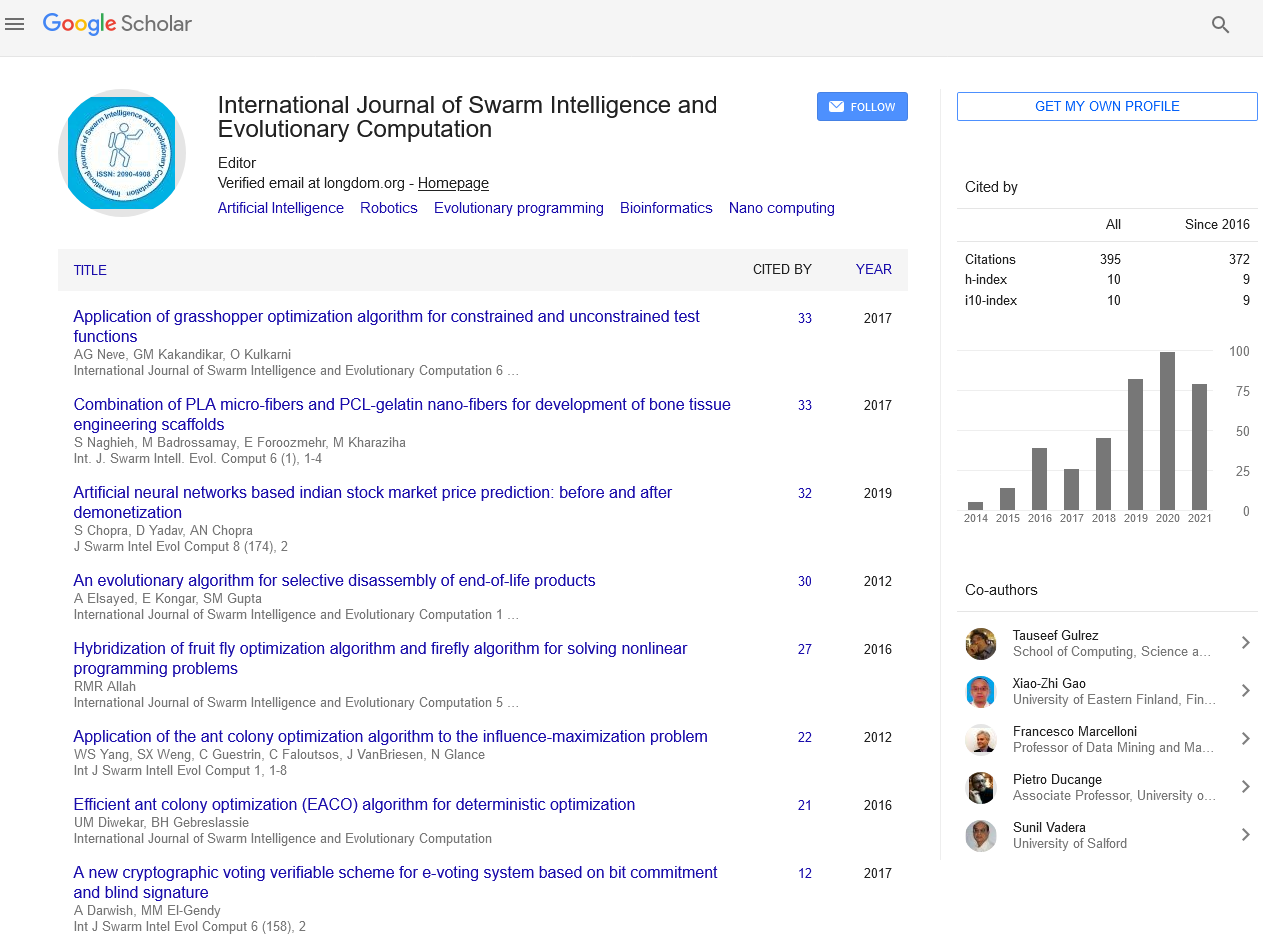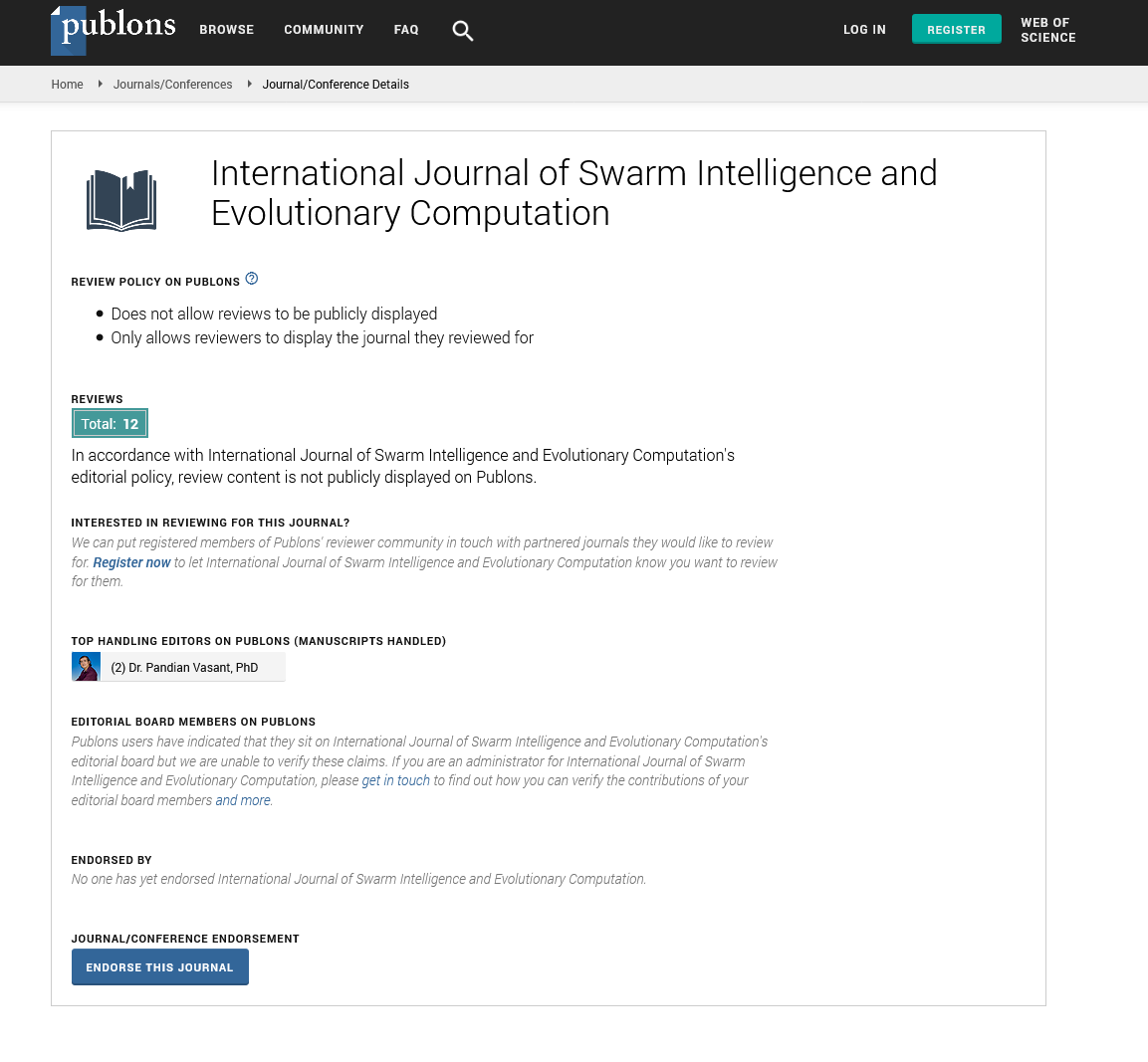Indexed In
- Genamics JournalSeek
- RefSeek
- Hamdard University
- EBSCO A-Z
- OCLC- WorldCat
- Publons
- Euro Pub
- Google Scholar
Useful Links
Share This Page
Journal Flyer

Open Access Journals
- Agri and Aquaculture
- Biochemistry
- Bioinformatics & Systems Biology
- Business & Management
- Chemistry
- Clinical Sciences
- Engineering
- Food & Nutrition
- General Science
- Genetics & Molecular Biology
- Immunology & Microbiology
- Medical Sciences
- Neuroscience & Psychology
- Nursing & Health Care
- Pharmaceutical Sciences
Commentary - (2024) Volume 13, Issue 4
Developmental Swarm Intelligence: Enhancing Collective Behavior through Evolutionary Principles
James Langer*Received: 28-Jun-2024, Manuscript No. SIEC-24-26597; Editor assigned: 01-Jul-2024, Pre QC No. SIEC-24-26597 (PQ); Reviewed: 16-Jul-2024, QC No. SIEC-24-26597; Revised: 24-Jul-2024, Manuscript No. SIEC-24-26597 (R); Published: 31-Jul-2024, DOI: 10.35248/2090-4908.24.13.383
Description
Swarm Intelligence (SI) refers to the collective behavior of decentralized, self-organized systems, typically composed of a population of simple agents interacting locally with one another and with their environment. Developmental Swarm Intelligence (DSI) extends this concept by incorporating principles of development, evolution, and learning. Swarm intelligence has been inspired by the social behaviors of organisms such as ants, bees, birds, and fish. These natural swarms exhibit remarkable abilities in resource allocation, foraging, and navigation through simple yet efficient rules of interaction. DSI enhances traditional SI by integrating developmental processes, allowing systems to adapt and evolve over time, improving their performance and resilience.
Principles
Some principles of developmental swarm intelligence are:
Self-organization: Agents in a swarm interact based on local information without centralized control. This leads to the emergence of complex global behaviors from simple local rules.
Adaptation and learning: DSI systems can learn from their environment and experiences, modifying their behavior to improve efficiency and adaptability.
Evolutionary processes: Incorporating principles of natural selection, mutation, and reproduction, DSI allows for the evolution of agent behaviors and swarm strategies.
Developmental stages: Agents undergo developmental phases, where their capabilities and roles within the swarm evolve over time.
Computational models of DSI
Some of the computational models of DSI includes:
Genetic algorithms and evolutionary strategies: These algorithms mimic natural evolution to optimize problem-solving strategies. They form the basis for many DSI models, providing mechanisms for mutation, crossover, and selection.
Particle Swarm Optimization (PSO): PSO models the social behavior of bird flocks and fish schools, where agents (particles) adjust their positions based on personal and collective experiences.
Artificial neural networks and neuro-evolution: Integrating neural networks with evolutionary algorithms allows DSI systems to develop complex behaviors through learning and adaptation.
Developmental robotics: Robots with DSI capabilities can adapt their behavior and morphology over time, improving their ability to perform tasks in dynamic environments.
Applications
Applications of developmental swarm intelligence includes:
Optimization problems: DSI has been successfully applied to various optimization problems, including function optimization, scheduling, and resource allocation. Its ability to adapt and evolve makes it particularly suited for dynamic and complex optimization tasks.
Robotics: In swarm robotics, DSI enables the development of autonomous robots that can cooperate, adapt, and evolve in realtime. Applications include search and rescue missions, environmental monitoring, and exploration.
Distributed computing: DSI algorithms enhance distributed systems performance by optimizing resource utilization, load balancing, and fault tolerance. They are particularly useful in large-scale, heterogeneous computing environments.
Bioinformatics: DSI techniques have been applied to analyze biological data, such as gene expression and protein folding, where traditional methods struggle with the complexity and volume of data.
Smart cities: In urban planning and management, DSI can optimize traffic flow, energy consumption, and waste management, contributing to more sustainable and efficient cities.
Conclusion
Developmental swarm intelligence represents a promising advancement in the field of computational intelligence. By integrating principles of development, evolution, and learning, DSI systems can adapt and evolve, offering strong solutions to complex problems. Despite its successes, DSI faces several challenges. These include the need for improved scalability and real-time adaptability. Additionally, ethical considerations arise from the autonomous and evolving nature of DSI systems, particularly in applications involving human interaction and decision-making. Continued research and innovation in this area will further enhance our understanding and application of DSI, driving progress across various domains.
Citation: Langer J (2024) Developmental Swarm Intelligence: Enhancing Collective Behavior through Evolutionary Principles. Int J Swarm Evol Comput. 13:383.
Copyright: © 2024 Langer J. This is an open-access article distributed under the terms of the Creative Commons Attribution License, which permits unrestricted use, distribution, and reproduction in any medium, provided the original author and source are credited.


